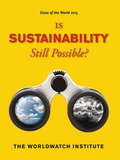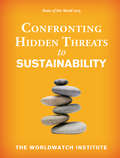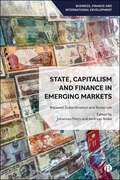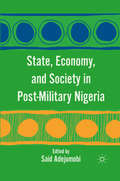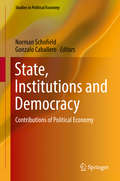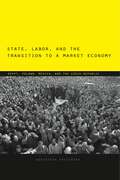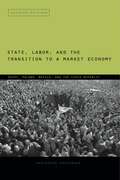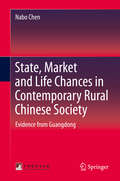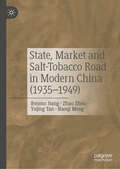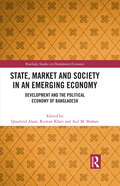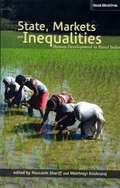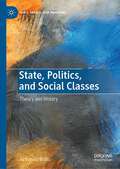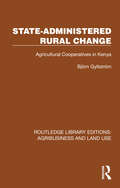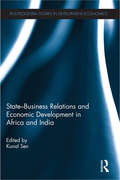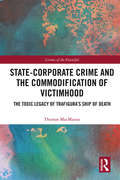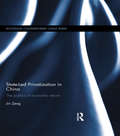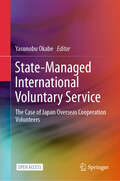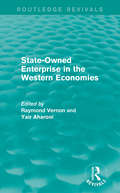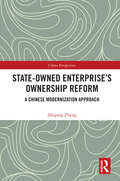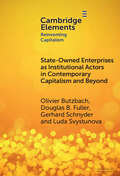- Table View
- List View
State of the World 2013
by Worldwatch InstituteEvery day, we are presented with a range of "sustainable" products and activities--from "green" cleaning supplies to carbon offsets--but with so much labeled as "sustainable," the term has become essentially sustainababble, at best indicating a practice or product slightly less damaging than the conventional alternative. Is it time to abandon the concept altogether, or can we find an accurate way to measure sustainability? If so, how can we achieve it? And if not, how can we best prepare for the coming ecological decline? In the latest edition of Worldwatch Institute's State of the World series, scientists, policy experts, and thought leaders tackle these questions, attempting to restore meaning to sustainability as more than just a marketing tool. In State of the World 2013: Is Sustainability Still Possible?, experts define clear sustainability metrics and examine various policies and perspectives, including geoengineering, corporate transformation, and changes in agricultural policy, that could put us on the path to prosperity without diminishing the well-being of future generations. If these approaches fall short, the final chapters explore ways to prepare for drastic environmental change and resource depletion, such as strengthening democracy and societal resilience, protecting cultural heritage, and dealing with increased conflict and migration flows. State of the World 2013 cuts through the rhetoric surrounding sustainability, offering a broad and realistic look at how close we are to fulfilling it today and which practices and policies will steer us in the right direction. This book will be especially useful for policymakers, environmental nonprofits, and students of environmental studies, sustainability, or economics.
State of the World 2013: Is Sustainability Still Possible?
by The Worldwatch InstituteEvery day, we are presented with a range of "sustainable" products and activities--from "green" cleaning supplies to carbon offsets--but with so much labeled as "sustainable," the term has become essentially sustainababble, at best indicating a practice or product slightly less damaging than the conventional alternative. Is it time to abandon the concept altogether, or can we find an accurate way to measure sustainability? If so, how can we achieve it? And if not, how can we best prepare for the coming ecological decline? In the latest edition of Worldwatch Institute's State of the World series, scientists, policy experts, and thought leaders tackle these questions, attempting to restore meaning to sustainability as more than just a marketing tool. In State of the World 2013: Is Sustainability Still Possible?, experts define clear sustainability metrics and examine various policies and perspectives, including geoengineering, corporate transformation, and changes in agricultural policy, that could put us on the path to prosperity without diminishing the well-being of future generations. If these approaches fall short, the final chapters explore ways to prepare for drastic environmental change and resource depletion, such as strengthening democracy and societal resilience, protecting cultural heritage, and dealing with increased conflict and migration flows. State of the World 2013 cuts through the rhetoric surrounding sustainability, offering a broad and realistic look at how close we are to fulfilling it today and which practices and policies will steer us in the right direction. This book will be especially useful for policymakers, environmental nonprofits, and students of environmental studies, sustainability, or economics.
State of the World 2015
by The Worldwatch The Worldwatch InstituteWe think we understand environmental damage: pollution, water scarcity, a warming world. But these problems are just the tip of the iceberg. Food insecurity, financial assets drained of value by environmental damage, and a rapid rise in diseases of animal originare among the underreported consequences of an unsustainable global system. In State of the World 2015, the flagship publication of The Worldwatch Institute, experts explore hidden threats to sustainability and howto address them. How will nations deal with migration as climate change refugees cross borders in order to escape flooding, drought, or other extreme weather events? What will happen to the price and availability offossil energy--the foundation of industrial civilization--as these resources oscillate between surplus and scarcity? If perpetual economic growth on a finite planet is impossible, what are the alternatives? Can national governments manage the transition?Eight key issues are addressed in depth,along with the central question ofhow we can develop resilience to these and other shocks. For decades, The Worldwatch Institute has been a leader in identifying and analyzing emerging environmental threats. With the latest edition of State of The World, the authorities at Worldwatch bring to light challenges we can no longer afford to ignore.
State on Board!: Navigating Corporate Governance in Emerging Market Business
by Nga Pham Kok-Boon OhResearch in this book focuses on the strategic behaviour of the State as a shareholder in businesses, and the implications it has for the other shareholder(s) and business performance. It investigates the institutional characteristics of State-linked and State-owned firms (SIEs & SOEs), in emerging markets using Vietnam as a case study with comparative analysis on China and selected ASEAN countries.In doing so, the book adopts an evidence-based approach to explain the State’s role as a shareholder in the different aspects of corporate governance, including CEO appointment, board structure and impact of State ownership on business strategy and performance. It highlights the influence of the State as a shareholder by investigating institutional factors consistent with “path dependence” theory, which postulates that the initial and underlying structure of an economy influences its performance. In addition, the book presents empirical evidence of the dynamics of corporate governance arising from interactions between the State and other shareholders, which has not yet been addressed in the literature, and is distinctive in providing new insights from both qualitative and empirical research on how to successfully navigate the emerging market business environments from the perspective of the State as an “owner-participant”. Explaining the theoretical constructs in corporate governance in State-invested firms, empirical research methodologies, and results to draw and validate inferences, the book is comprehensive and provides a practical guide for practitioners as well as a reference for academics, undergraduate and postgraduate students. The new theoretical models proposed integrate traditional political-economic and agency theories, which also underpin tertiary business courses and academic research.
State, Capitalism, and Finance in Emerging Markets: Between Subordination and Statecraft (Business, Finance and International Development)
by Johannes Petry and Andreas NölkeWhat role do emerging markets play in the global financial system? Are they subordinated within global financial hierarchies? Or do they have autonomy, even power, to use finance to pursue state objectives? In this edited volume, leading scholars explore these questions, focusing on state–finance interactions globally. The book combines literatures on international financial subordination, financial statecraft and comparative capitalism to analyse state–finance relationships in emerging markets, particularly the BRICS: Brazil, Russia, India, China, and South Africa. It reveals that these states can control their domestic financial sectors despite global subordination, though their ability to do so varies significantly. This essential volume offers profound insights into how emerging markets are reshaping global finance for scholars and policy makers.
State, Economy, and Society in Post-Military Nigeria
by Said AdejumobiThis book analyzes how neo-liberal state economic policies and political reforms have impacted on state-society relations, economic and class configurations, social composition of power, social welfare and cohesion in post-military Nigeria; and points to key policy recommendations that may be crucial in redirecting the future of the country.
State, Institutions and Democracy
by Norman Schofield Gonzalo CaballeroThis book presents a set of original and innovative contributions on state, institutions and democracy in the field of political economy. Modern political economy has implied the interaction between politics and economics to understand political, electoral and public issues in different nations, and in this volume a group of leading political economists and political scientists from Europe, America and Asia provides theoretical advances, modelling and case studies on main topics in political economy. The analysis of the role and performance of politics and democracy in diverse nations implies the study of the organization of the state, lobbying, political participation, public policies, electoral politics, public administration and the provision of public services. This book provides advances in the research frontier of these topics and combines historical evidence, institutional analysis, mathematical models and empirical analysis in an interdisciplinary approach. Political and social scientists, economists and those interested in the performance of states, democracy and elections can find new research results in this volume.
State, Labor, and the Transition to a Market Economy: Egypt, Poland, Mexico, and the Czech Republic
by Agnieszka PaczyńskaIn response to mounting debt crises and macroeconomic instability in the 1980s, many countries in the developing world adopted neoliberal policies promoting the unfettered play of market forces and deregulation of the economy and attempted large-scale structural adjustment, including the privatization of public-sector industries. How much influence did various societal groups have on this transition to a market economy, and what explains the variances in interest-group influence across countries? In this book, Agnieszka Paczyńska explores these questions by studying the role of organized labor in the transition process in four countries in different regions—the Czech Republic and Poland in eastern Europe, Egypt in the Middle East, and Mexico in Latin America. In Egypt and Poland, she shows, labor had substantial influence on the process, whereas in the Czech Republic and Mexico it did not. Her explanation highlights the complex relationship between institutional structures and the “critical junctures” provided by economic crises, revealing that the ability of groups like organized labor to wield influence on reform efforts depends to a great extent on not only their current resources (such as financial autonomy and legal prerogatives) but also the historical legacies of their past ties to the state.
State, Labor, and the Transition to a Market Economy: Egypt, Poland, Mexico, and the Czech Republic
by Agnieszka PaczyńskaIn response to mounting debt crises and macroeconomic instability in the 1980s, many countries in the developing world adopted neoliberal policies promoting the unfettered play of market forces and deregulation of the economy and attempted large-scale structural adjustment, including the privatization of public-sector industries. How much influence did various societal groups have on this transition to a market economy, and what explains the variances in interest-group influence across countries? In this book, Agnieszka Paczyńska explores these questions by studying the role of organized labor in the transition process in four countries in different regions—the Czech Republic and Poland in eastern Europe, Egypt in the Middle East, and Mexico in Latin America. In Egypt and Poland, she shows, labor had substantial influence on the process, whereas in the Czech Republic and Mexico it did not. Her explanation highlights the complex relationship between institutional structures and the “critical junctures” provided by economic crises, revealing that the ability of groups like organized labor to wield influence on reform efforts depends to a great extent on not only their current resources (such as financial autonomy and legal prerogatives) but also the historical legacies of their past ties to the state.This new edition features an epilogue that analyzes the role of organized labor uprisings in 2011, the protests in Egypt, the overthrow of Mubarak, and the post-Mubarak regime.
State, Labor, and the Transition to a Market Economy: Egypt, Poland, Mexico, and the Czech Republic
by Agnieszka PaczyńskaIn response to mounting debt crises and macroeconomic instability in the 1980s, many countries in the developing world adopted neoliberal policies promoting the unfettered play of market forces and deregulation of the economy and attempted large-scale structural adjustment, including the privatization of public-sector industries. How much influence did various societal groups have on this transition to a market economy, and what explains the variances in interest-group influence across countries? In this book, Agnieszka Paczyńska explores these questions by studying the role of organized labor in the transition process in four countries in different regions—the Czech Republic and Poland in eastern Europe, Egypt in the Middle East, and Mexico in Latin America. In Egypt and Poland, she shows, labor had substantial influence on the process, whereas in the Czech Republic and Mexico it did not. Her explanation highlights the complex relationship between institutional structures and the “critical junctures” provided by economic crises, revealing that the ability of groups like organized labor to wield influence on reform efforts depends to a great extent on not only their current resources (such as financial autonomy and legal prerogatives) but also the historical legacies of their past ties to the state.This new edition features an epilogue that analyzes the role of organized labor uprisings in 2011, the protests in Egypt, the overthrow of Mubarak, and the post-Mubarak regime.
State, Market and Life Chances in Contemporary Rural Chinese Society
by Nabo ChenThis study focuses on the effects of market reform on the life chances of rural people in China. Based on comparative ethnographical evidence from three townships of rural Guangdong province, this book provides a more recent and detailed story about the social inequality in rural China, a further explanation for the institutional analysis on the social stratification of China, a new typology of the developmental results and the changing roles of political elite of rural china.
State, Market and Salt-Tobacco Road in Modern China (1935–1949)
by Benmo Jiang Zhao Zhou Yujing Tan Haoqi MengThrough a meticulous analysis of various historical sources, the authors of this book have uncovered a wealth of information on the trade of salt and tobacco in Guizhou province, southwest of China, in the 1930s and 1940s. Their findings not only shed light on how commercial networks and the flow of these commodities formed and transformed with the development of wartime state monopoly, but also offer a more comprehensive perspective on the role of merchants and entrepreneurs in regulated commodity chains to go beyond the dichotomous state-market perspective of socioeconomic analysis.
State, Market and Society in an Emerging Economy: Development and the Political Economy of Bangladesh (Routledge Studies in Development Economics)
by Quamrul Alam Asif M. Shahan Rizwan KhairThe economic and social development that Bangladesh has achieved in the past two decades has made Bangladesh a development paradox. This book tries to explain this paradox through a political economy lens. The book explains the linkages between the state, changing society and emerging private sector, and examines whether the social transformation taking place in Bangladesh has the potential to live up to the expectations of a middle- income country. The early part of the book unravels the myriad relations between the state, society and market to project the aspirations of a newly independent nation. It analyzes how political turmoil, militarization of politics, politicization of institutions, reforms initiatives, industrial and social development policies, and the power nexus influenced the nature of the political economy of Bangladesh. The book goes on to examine how domestic appetite for capital and raw materials, the digital revolution, and the capacity of the local market to absorb expanded economic activities have created an environment that catalyzes innovation and entrepreneurship. The book also explains how the country has attempted to transform from an agrarian to a manufacturing- based economy, with rapid growth in the ready- made garment industry, pisciculture, pharmaceuticals and the ICT sector. Bangladesh’s journey from an emerging economy towards a developed country would interest those researching on development economics and those in policy making.
State, Markets and Inequalities: Human Development in Rural India
by Abusaleh Shariff Maithreyi KrishnarajAddressing the role of social sector in alleviating deprivation, this book highlights the deprivation across states and social groups, and analyzes the causes.
State, Politics, and Social Classes: Theory and History (Marx, Engels, and Marxisms)
by Armando BoitoThis book offers a reassessment politics against the predominating economicist approach to historical materialism within contemporary Marxism. Boito draws on the structural interpretation of Marxism inspired by Althusser’s works of the mid-1960s and, especially, by Poulantzas’ Political Power and Social Classes. The volume aims to demonstrate the role of the political dimension (together with the economy) and, to a further extent, to contribute to renew contemporary Marxist political theory. The chapters cover topics such as: the nature of political power; the structure and functions of the state; the role of politics in historical change; political crises; and the political formation of the working class. The book highlights the role of political structures and practices in the reproduction of economic and social relations and also in the process of historical change. The aim of the book is to contribute to the renewal of Marxist thought, breaking with the economicist conception that dominated it throughout the last century, and finally meeting the demands of the socialist struggle in the 21st century.
State-Administered Rural Change: Agricultural Cooperatives in Rural Kenya (Routledge Library Editions: Agribusiness and Land Use #12)
by Björn GyllströmOriginally published in 1991, this book includes a detailed case study of Kenya’s co-operative movement – one of the largest in sub-Saharan Africa. Co-operatives have been given a major role in rural development strategies in both socialist and capitalist states. However in both context the results they have achieved have fallen short of expectations. The book focuses on specific elements of the institutional setting within which agricultural marketing co-operatives operate. Factors like land tenure, market regulations, co-operative legislation and direct development support are discussed and shown to have had dire effects on the managerial behaviour and social impact of the co-operative sector.
State-Business Relations and Economic Development in Africa and India (Routledge Studies in Development Economics)
by Kunal SenWhen the state and business interact effectively they can promote a more efficient allocation of scarce resources, appropriate industrial policy and a more effective and prioritised removal of key obstacles to growth, than when the two sides fail to co-operate or engage in harmful collusion. This book, based on original empirical research undertaken in Africa and India, addresses what constitutes the effectiveness of state-business relations, what explains their formation and evolution over time and whether effective state-business relations matter for economic performance. Analysing the effects of state-business relations on economic performance at both the macro and micro levels, the book concludes that where effective state-business relations are established – either through formal or informal institutional patterns and relationships – the growth effects are generally positive. Establishing, sustaining and renewing effective state-business relations are political processes. The better organized the business community and the government are for purposes of such relations, the more effective state-business relations will be in negotiating growth enhancing policies. The book is of interest to researchers in the fields of development studies, management, economics and political science.
State-Corporate Crime and the Commodification of Victimhood: The Toxic Legacy of Trafigura’s Ship of Death (Crimes of the Powerful)
by Thomas MacManusThis book highlights the continuing impunity enjoyed by corporations for large scale crimes, and in particular the crime of toxic waste dumping in Ivory Coast in 2006. It provides an account of the crime, and outlines contributory reasons for the impunity both under the law and from a criminological point of view. Furthermore, the book reveals the retrogressive role of civil society organisations (CSOs) in Ivory coast, contrary to the societal expectations made of 'non-governmental' organisations (NGOs) and CSOs. This book reveals that in the case of this particular example of state-corporate crime, civil society as an agency of censure and sanction actually played a distinctly retrogressive role. Here, in fact, state and state-corporate crime facilitates corruption within the civil society sphere through a process referred to in the book as the ‘commodification of victimhood’ and, as a result, ensures that impunity is virtually guaranteed for the corporation and the Ivorian government. This book also examines the failure of international and domestic legal measures to sanction the perpetrators alongside civil society’s shortcomings and ultimately advocates a more cautionary approach to civil society’s potential to label, censure and sanction large-scale state-corporate crime. This book will help readers understand the difficulties in sanctioning such crime as well as promoting the theoretical framework of state crime, the understanding of which could lead to the alleviation of human suffering at the hands of criminal states and corporations.
State-Directed Development
by Atul KohliWhy have some developing country states been more successful at facilitating industrialization than others? An answer to this question is developed by focusing both on patterns of state construction and intervention aimed at promoting industrialization. Four countries are analyzed in detail - South Korea, Brazil, India, and Nigeria - over the twentieth century. The states in these countries varied from cohesive-capitalist (mainly in Korea), through fragmented-multiclass (mainly in India), to neo-patrimonial (mainly in Nigeria). It is argued that cohesive-capitalist states have been most effective at promoting industrialization and neo-patrimonial states the least. The performance of fragmented-multiclass states falls somewhere in the middle. After explaining in detail as to why this should be so, the study traces the origins of these different state types historically, emphasizing the role of different types of colonialisms in the process of state construction in the developing world.
State-Led Privatization in China: The Politics of Economic Reform (Routledge Contemporary China Series)
by Jin ZengLarge-scale privatization did not emerge spontaneously in China in the late 1990s. Rather, the Chinese state led and carefully “planned” ownership transformation with timetables and measurable privatization quotas, not for the purpose of extracting the state from the economy, but in order to strengthen the rule of the Party. While it is widely believed that authoritarian regimes are better suited than democracies to carry out economic reform, this book provides a more nuanced understanding of reform in China, demonstrating that the Chinese state’s capacity to impose unpopular reform is contingent on its control over local state agents and its adaptability to societal demands. Building on rich fieldwork data gathered in three Chinese cities (Shenyang, Shanghai, and Xiamen), this book offers the first comparative study of China’s privatization processes at the local level. Instead of focusing solely on political elites, Jin Zeng adopts a multi-level interaction approach to examine how the complex interplay of the central leadership, grassroots officials, and state-owned enterprise managers and workers shaped the contour of privatization in China.The book advances three central arguments. First, local economic structure and cadre evaluation system mediated local officials’ incentives to initiate privatization. Second, local officials relied on mobilization campaigns and various appeasement measures to implement privatization. Finally, the dynamics of privatization were fundamentally driven by the central government’s reactions to social opposition and by the subsequent responses of local officials to the changed political-regulatory environment. As a detailed analysis of the dual transformation of the property regime and state–society relations in China, this book will be invaluable to students and scholars of Chinese politics, economic reform, as well as those interested in comparative political economy and economic development more broadly.
State-Managed International Voluntary Service: The Case of Japan Overseas Cooperation Volunteers
by Yasunobu OkabeThis open access book addresses two issues of state-managed international voluntary service (SMIVS)—its contributions and advantages/disadvantages—by the case study of Japan Overseas Cooperation Volunteers (JOCV). Until now, the literature has given little attention to SMIVS and Asian international voluntary service (IVS). Proposing the concept of SMIVS, this is the first book in English to focus on JOCV and IVS managed by the Japanese government. The book is organized into two parts. In Part I, the authors, including scholars, former volunteers, and practitioners, explore the contributions of JOCV to the development in host communities, personal and professional development of volunteers, and Japanese civil society. In Part II, the authors analyze how JOCV creates advantages such as multilevel support by the Japan International Cooperation Agency (JICA), a Japanese government aid agency, and disadvantages such as the weak expertise of volunteers. The authors’ theoretical approaches cover capacity development, social capital, gift theory, and institutional theory, and their methodologies include statistical analysis of survey data, interview-based anthropological interpretation, and single/comparative case study. This combination of multiple approaches and methodologies is a strong feature of the study reported here. Thanks to state management, as the book demonstrates, JOCV can facilitate mutual benefits between volunteers and host communities, enhancing the human capital of the former and contributing to the socioeconomic development of the latter. It also shows that Japanese volunteers blend into host communities well, respecting and learning their social values and perspectives. This achievement is accomplished to the extent that collaborative and equal interpersonal relationships are nurtured between the volunteers and local people, including counterparts. Thus, this book helps to reduce inequality and stereotypes in IVS, with implications for other state-managed IVS.
State-Owned Enterprise in the Western Economies (Routledge Revivals)
by Raymond Vernon and Yair AharoniFirst published in 1981, this edited collection reviews the operations of state-owned enterprises, examining the actual performance of such organisations in the advanced industrialised countries. The authors consider the regularities and characteristics of state-owned enterprises, in particular the persistent efforts of managers to increase their autonomy and escape from the oversight of government agencies and the public. Chapters consider principles of finance and decision-making in these organisations and provide a truly international perspective with case studies in Italy, France and Britain. This is a timely reissue in context of the current economic climate, which will be of great value to students and academics with an interest in the nationalisation of companies, international business and the relationship between governments and managers.
State-Owned Enterprise's Ownership Reform: A Chinese Modernization Approach (China Perspectives)
by Zhigang ZhengIn reviewing the new round of state-owned enterprise (SOE) reforms characterized by mixed ownership since 2013 in China, this book systematically investigates the theoretical underpinnings, model options and approaches to implementation of SOE mixed-ownership reforms. SOE reforms have functioned as an integral part of China’s transformation to a market-oriented economy. Responding to the changing economic context and negative repercussions of earlier SOE reforms launched in the late 1990s, SOE mixed-ownership reforms encourage the participation of different types of capital and sounder management mechanisms. The author first reviews the impetus behind SOE mixed-ownership reforms and discusses how modern property rights theory and decentralized control theory perform as the theoretical underpinnings of the reforms. Based on cases of many completed SOE mixed-ownership reforms, the book summarizes and assesses the feasible models and implementation details of the reforms. It also examines how the reforms have impacted state-owned assets as well as executives’ compensation and incentives, both of which run parallel to the core reforms surrounding ownership. The book will appeal to professional readers studying entrepreneurial theory, corporate governance, China’s SOE reforms and Chinese business and the economy, as well as investors and policy makers interested in the Chinese market and Chinese enterprise reform.
State-Owned Enterprises as Institutional Actors in Contemporary Capitalism and Beyond (Elements in Reinventing Capitalism)
by Olivier Butzbach Douglas B. Fuller Gerhard Schnyder Luda SvystunovaThis Element qualifies the common understanding of State-Owned Enterprises (SOEs) as mere instruments of the state and instead conceive of them as economic actors in their own right. Specifically, SOE top management teams have leeway to diverge from goals that the state they are owned by pursues. Through 'institutional work' they can even actively shape the institutional framework in which they are embedded. However, the extent of SOE top management teams' leeway for agency is determined by macro- (country), meso- (State–SOE governance system), and industry-level factors. These factors, in turn, vary from country to country and over time. In other words, SOE agency is 'embedded agency.' Combining institutional work and historical institutionalism analytic lenses, this Element presents a multilevel model to understand embedded agency of top management teams of SOEs in contemporary capitalism. The model adds an important element to our understanding of the 'new state capitalism.'
State-Owned Enterprises in Developed Market Economies: Theory and Empirics (Elements in Public Economics)
by Chiara F. Del Bo Massimo Florio Marco Frigerio Daniela VandoneAfter briefly reviewing the received doctrine prior to the waves of privatisations beginning in the 1980s, this Element offers a survey of various analytical frameworks on State Owned Enterprises (SOEs) from the perspective of applied welfare economics. The focus then shifts to a positive analysis of the comparative performance of private versus public enterprises, with a specific emphasis on SOEs in developed market economies over the past two decades; key metrics examined include profitability, productivity, internationalisation, innovativeness, and environmental sustainability. The Element also addresses empirical methodological issues, alongside contextual conditions and institutional factors that help explain the outcomes. It reviews selected contributions from public economics, industrial organisation, corporate governance, management studies and other social sciences. Overall, the Element aims to redefine a neglected research area in public economics, considering the new circumstances of the twenty-first century, where SOEs compete with other firms in developed market economies.
